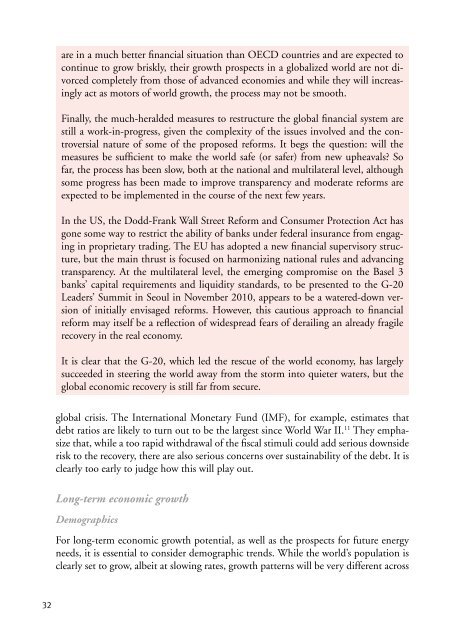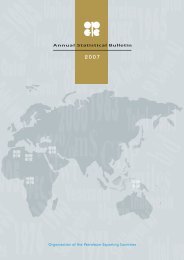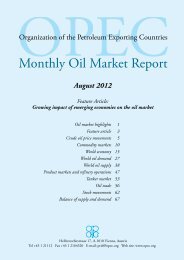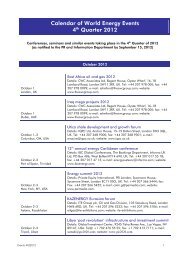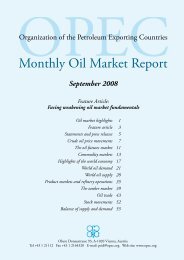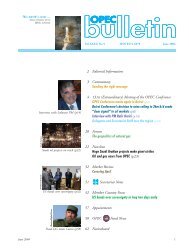Create successful ePaper yourself
Turn your PDF publications into a flip-book with our unique Google optimized e-Paper software.
32<br />
are in a much better financial situation than OECD countries and are expected to<br />
continue to grow briskly, their growth prospects in a globalized wor<strong>ld</strong> are not divorced<br />
completely from those of advanced economies and wh<strong>il</strong>e they w<strong>il</strong>l increasingly<br />
act as motors of wor<strong>ld</strong> growth, the process may not be smooth.<br />
Finally, the much-hera<strong>ld</strong>ed measures to restructure the global financial system are<br />
st<strong>il</strong>l a work-in-progress, given the complexity of the issues involved and the controversial<br />
nature of some of the proposed reforms. It begs the question: w<strong>il</strong>l the<br />
measures be sufficient to make the wor<strong>ld</strong> safe (or safer) from new upheavals? So<br />
far, the process has been slow, both at the national and mult<strong>il</strong>ateral level, although<br />
some progress has been made to improve transparency and moderate reforms are<br />
expected to be implemented in the course of the next few years.<br />
In the US, the Dodd-Frank Wall Street Reform and Consumer Protection Act has<br />
gone some way to restrict the ab<strong>il</strong>ity of banks under federal insurance from engaging<br />
in proprietary trading. The EU has adopted a new financial supervisory structure,<br />
but the main thrust is focused on harmonizing national rules and advancing<br />
transparency. At the mult<strong>il</strong>ateral level, the emerging compromise on the Basel 3<br />
banks’ capital requirements and liquidity standards, to be presented to the G-20<br />
Leaders’ Summit in Seoul in November 2010, appears to be a watered-down version<br />
of initially envisaged reforms. However, this cautious approach to financial<br />
reform may itself be a reflection of widespread fears of dera<strong>il</strong>ing an already frag<strong>il</strong>e<br />
recovery in the real economy.<br />
It is clear that the G-20, which led the rescue of the wor<strong>ld</strong> economy, has largely<br />
succeeded in steering the wor<strong>ld</strong> away from the storm into quieter waters, but the<br />
global economic recovery is st<strong>il</strong>l far from secure.<br />
global crisis. The International Monetary Fund (IMF), for example, estimates that<br />
debt ratios are likely to turn out to be the largest since Wor<strong>ld</strong> War II. 11 They emphasize<br />
that, wh<strong>il</strong>e a too rapid withdrawal of the fiscal stimuli cou<strong>ld</strong> add serious downside<br />
risk to the recovery, there are also serious concerns over sustainab<strong>il</strong>ity of the debt. It is<br />
clearly too early to judge how this w<strong>il</strong>l play out.<br />
Long-term economic growth<br />
Demographics<br />
For long-term economic growth potential, as well as the prospects for future energy<br />
needs, it is essential to consider demographic trends. Wh<strong>il</strong>e the wor<strong>ld</strong>’s population is<br />
clearly set to grow, albeit at slowing rates, growth patterns w<strong>il</strong>l be very different across


